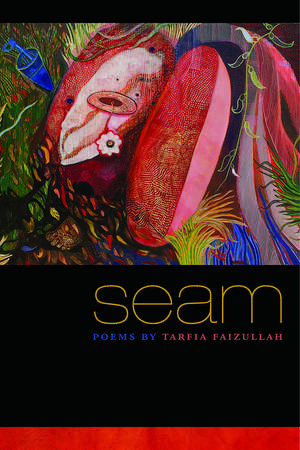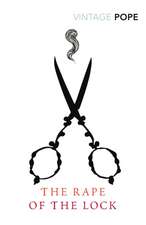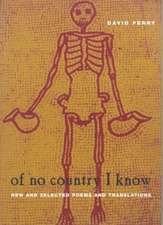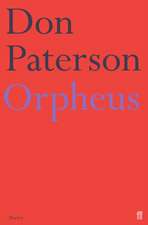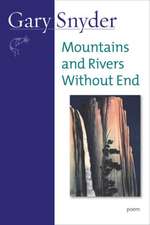Seam: Crab Orchard Series in Poetry
Autor Tarfia Faizullahen Limba Engleză Paperback – 6 mar 2014
The poems in this captivating collection weave beauty with violence, the personal with the historic as they recount the harrowing experiences of the two hundred thousand female victims of rape and torture at the hands of the Pakistani army during the 1971 Liberation War. As the child of Bangladeshi immigrants, the poet in turn explores her own losses, as well as the complexities of bearing witness to the atrocities these war heroines endured.
Throughout the volume, the narrator endeavors to bridge generational and cultural gaps even as the victims recount the horror of grief and personal loss. As we read, we discover the profound yet fragile seam that unites the fields, rivers, and prisons of the 1971 war with the poet’s modern-day hotel, or the tragic death of a loved one with the holocaust of a nation.
Moving from West Texas to Dubai, from Virginia to remote villages in Bangladesh and back again, the narrator calls on the legacies of Willa Cather, César Vallejo, Tomas Tranströmer, and Paul Celan to give voice to the voiceless. Fierce yet loving, devastating and magical at once, Seam is a testament to the lingering potency of memory and the bravery of a nation’s victims.
Winner, Great Lakes Colleges Association New Writers Award, 2014
Winner, Binghamton University Milt Kessler Poetry Book Award, 2015
Winner, Drake University Emerging Writers Award, 2015
Throughout the volume, the narrator endeavors to bridge generational and cultural gaps even as the victims recount the horror of grief and personal loss. As we read, we discover the profound yet fragile seam that unites the fields, rivers, and prisons of the 1971 war with the poet’s modern-day hotel, or the tragic death of a loved one with the holocaust of a nation.
Moving from West Texas to Dubai, from Virginia to remote villages in Bangladesh and back again, the narrator calls on the legacies of Willa Cather, César Vallejo, Tomas Tranströmer, and Paul Celan to give voice to the voiceless. Fierce yet loving, devastating and magical at once, Seam is a testament to the lingering potency of memory and the bravery of a nation’s victims.
Winner, Great Lakes Colleges Association New Writers Award, 2014
Winner, Binghamton University Milt Kessler Poetry Book Award, 2015
Winner, Drake University Emerging Writers Award, 2015
Din seria Crab Orchard Series in Poetry
-
 Preț: 178.97 lei
Preț: 178.97 lei -
 Preț: 153.88 lei
Preț: 153.88 lei -
 Preț: 161.87 lei
Preț: 161.87 lei -
 Preț: 96.30 lei
Preț: 96.30 lei - 34%
 Preț: 119.18 lei
Preț: 119.18 lei - 27%
 Preț: 119.35 lei
Preț: 119.35 lei - 23%
 Preț: 118.92 lei
Preț: 118.92 lei - 34%
 Preț: 119.18 lei
Preț: 119.18 lei - 34%
 Preț: 119.35 lei
Preț: 119.35 lei - 18%
 Preț: 112.55 lei
Preț: 112.55 lei - 27%
 Preț: 118.92 lei
Preț: 118.92 lei - 34%
 Preț: 118.92 lei
Preț: 118.92 lei - 27%
 Preț: 118.58 lei
Preț: 118.58 lei - 23%
 Preț: 119.18 lei
Preț: 119.18 lei - 23%
 Preț: 118.58 lei
Preț: 118.58 lei - 23%
 Preț: 119.18 lei
Preț: 119.18 lei - 34%
 Preț: 119.18 lei
Preț: 119.18 lei - 34%
 Preț: 118.58 lei
Preț: 118.58 lei -
 Preț: 90.14 lei
Preț: 90.14 lei - 23%
 Preț: 118.92 lei
Preț: 118.92 lei - 23%
 Preț: 119.18 lei
Preț: 119.18 lei - 34%
 Preț: 119.18 lei
Preț: 119.18 lei -
 Preț: 88.45 lei
Preț: 88.45 lei - 23%
 Preț: 119.18 lei
Preț: 119.18 lei - 23%
 Preț: 119.18 lei
Preț: 119.18 lei - 23%
 Preț: 118.58 lei
Preț: 118.58 lei - 23%
 Preț: 118.92 lei
Preț: 118.92 lei - 23%
 Preț: 118.92 lei
Preț: 118.92 lei - 27%
 Preț: 118.47 lei
Preț: 118.47 lei -
 Preț: 83.30 lei
Preț: 83.30 lei - 23%
 Preț: 119.18 lei
Preț: 119.18 lei - 34%
 Preț: 118.58 lei
Preț: 118.58 lei - 23%
 Preț: 119.18 lei
Preț: 119.18 lei - 34%
 Preț: 119.18 lei
Preț: 119.18 lei - 23%
 Preț: 118.76 lei
Preț: 118.76 lei - 22%
 Preț: 119.64 lei
Preț: 119.64 lei - 34%
 Preț: 119.18 lei
Preț: 119.18 lei - 23%
 Preț: 118.58 lei
Preț: 118.58 lei -
 Preț: 118.58 lei
Preț: 118.58 lei -
 Preț: 83.06 lei
Preț: 83.06 lei - 23%
 Preț: 118.58 lei
Preț: 118.58 lei - 23%
 Preț: 118.66 lei
Preț: 118.66 lei - 23%
 Preț: 118.58 lei
Preț: 118.58 lei - 18%
 Preț: 112.48 lei
Preț: 112.48 lei -
 Preț: 78.73 lei
Preț: 78.73 lei - 23%
 Preț: 118.58 lei
Preț: 118.58 lei - 23%
 Preț: 118.92 lei
Preț: 118.92 lei - 23%
 Preț: 118.92 lei
Preț: 118.92 lei - 34%
 Preț: 118.58 lei
Preț: 118.58 lei
Preț: 87.22 lei
Nou
Puncte Express: 131
Preț estimativ în valută:
16.69€ • 17.42$ • 13.81£
16.69€ • 17.42$ • 13.81£
Carte disponibilă
Livrare economică 14-28 martie
Preluare comenzi: 021 569.72.76
Specificații
ISBN-13: 9780809333257
ISBN-10: 0809333252
Pagini: 80
Dimensiuni: 152 x 229 x 10 mm
Greutate: 0.15 kg
Ediția:1st Edition
Editura: Southern Illinois University Press
Colecția Southern Illinois University Press
Seria Crab Orchard Series in Poetry
ISBN-10: 0809333252
Pagini: 80
Dimensiuni: 152 x 229 x 10 mm
Greutate: 0.15 kg
Ediția:1st Edition
Editura: Southern Illinois University Press
Colecția Southern Illinois University Press
Seria Crab Orchard Series in Poetry
Notă biografică
Tarfia Faizullah was born in Brooklyn, New York, in 1980, and raised in Midland, Texas, by parents who had immigrated to the United States from Bangladesh in 1978. She has an MFA in creative writing from Virginia Commonwealth University. Her poems have appeared or are forthcoming in The Missouri Review, Ninth Letter, Blackbird, The Massachusetts Review, The Southern Review, and elsewhere. A Kundiman fellow, she is the recipient of a Ploughshares Cohen Award, a Fulbright Fellowship, a Dorothy Sargent Rosenberg Prize, and scholarships from the Bread Loaf Writers’ Conference, the Sewanee Writers’ Conference, the Kenyon Writers’ Workshop, and other honors.
Extras
ELEGY WITH HER RED-TIPPED FINGERS
Two weeks ago I crossed two oceans wide as
the funeral processions to your grave:
bearded men continued to thumb plastic
prayer beads beside your sheet-swaddled
body. Grandmother, in Virginia, I cradled
the phone to my cheek and stood over the dark
skillet, waiting to turn over another slice
of bacon to slip into my mouth, knowing
well that that sin, too, like so many others,
would dissolve once I willed it to. Allah-er borosha,
I mumbled to your daughter: It's Allah's will:
words I knew couldn't fill even that half-filled
suitcase spilled out across hardwood floor: color
of those low, yellow plains of west Texas Mother
sobbed past on her way to the airport, compelling
her body faster towards yours before it disappeared
into its bamboo-bordered grave. Once, I stood
over your other granddaughter's grave while
cicadas hummed the sky clean. Once, I wanted
to be the white wind shirred across any open
field. Once, I lay beside you, a child unmoving,
a body slowly filling with feathers: together
we listened to Grandfather's breathing, labored
against white mosquito netting-and now you
too are dead, two weeks too early. Now, after
another stitch-thin rickshawallah pedals
my ocean-tugged body across those severed
Dhaka streets, and after I have slipped into his dark
fingers a few extra takahs, and after I have made
my way past storefronts choked with glittering
stacks of gold bangles, and after another tailor
has slipped from his neck the faded measuring
tape, and after he has pulled it taut across my back,
around my leg-who, if not you, will ask me
to tear free the folded fabric from its paper parcel
to finger its gleaming softness? Who will ask
of me its worth, its weight? I kneel, open another
razor, plastic-capped, from a slowly-emptying suitcase-
lotion, mosquito repellent, tape recorder-items
on a list I drew thick, black lines through. But
it won't be your voice I rewind over, fast-forward
through. It won't be your hair you'll sit beside
the window to rub henna into. It won't be
your red-tipped fingers I'll press a jar into:
small gift you won't have asked me to bring.
It won't be your veins I'll notice, too late: fluvial
ribbons rising stark and sudden through the silk-thin
skin of your hands that won't turn over another page
of newsprint dark with Bangla: language I speak
now to your grieving daughter, this language
the bodies of women were once broken
open for. Put up your hair, you will never
again admonish. Please let me see your lovely face.
Two weeks ago I crossed two oceans wide as
the funeral processions to your grave:
bearded men continued to thumb plastic
prayer beads beside your sheet-swaddled
body. Grandmother, in Virginia, I cradled
the phone to my cheek and stood over the dark
skillet, waiting to turn over another slice
of bacon to slip into my mouth, knowing
well that that sin, too, like so many others,
would dissolve once I willed it to. Allah-er borosha,
I mumbled to your daughter: It's Allah's will:
words I knew couldn't fill even that half-filled
suitcase spilled out across hardwood floor: color
of those low, yellow plains of west Texas Mother
sobbed past on her way to the airport, compelling
her body faster towards yours before it disappeared
into its bamboo-bordered grave. Once, I stood
over your other granddaughter's grave while
cicadas hummed the sky clean. Once, I wanted
to be the white wind shirred across any open
field. Once, I lay beside you, a child unmoving,
a body slowly filling with feathers: together
we listened to Grandfather's breathing, labored
against white mosquito netting-and now you
too are dead, two weeks too early. Now, after
another stitch-thin rickshawallah pedals
my ocean-tugged body across those severed
Dhaka streets, and after I have slipped into his dark
fingers a few extra takahs, and after I have made
my way past storefronts choked with glittering
stacks of gold bangles, and after another tailor
has slipped from his neck the faded measuring
tape, and after he has pulled it taut across my back,
around my leg-who, if not you, will ask me
to tear free the folded fabric from its paper parcel
to finger its gleaming softness? Who will ask
of me its worth, its weight? I kneel, open another
razor, plastic-capped, from a slowly-emptying suitcase-
lotion, mosquito repellent, tape recorder-items
on a list I drew thick, black lines through. But
it won't be your voice I rewind over, fast-forward
through. It won't be your hair you'll sit beside
the window to rub henna into. It won't be
your red-tipped fingers I'll press a jar into:
small gift you won't have asked me to bring.
It won't be your veins I'll notice, too late: fluvial
ribbons rising stark and sudden through the silk-thin
skin of your hands that won't turn over another page
of newsprint dark with Bangla: language I speak
now to your grieving daughter, this language
the bodies of women were once broken
open for. Put up your hair, you will never
again admonish. Please let me see your lovely face.
Cuprins
CONTENTS
Acknowledgments
1971 1
En Route to Bangladesh, Another Crisis of Faith 11
Reading Willa Cather in Bangladesh 13
[I place one foot then the other . . .] 15
Dhaka Aubade 16
Elegy with Her Red-Tipped Fingers 17
Reading Tranströmer in Bangladesh 20
Instructions for the Interviewer 23
[Tell her what happened to you . . .] 24
Interview with a Birangona
1. What were you doing when they came for you? 25
Interview with a Birangona
2. Where did the Pakistani military take you, and were there others there? 26
Interviewer's Note
i. [You walk past white high-rises] 27
Interview with a Birangona
3. Would you consider yourself a survivor or a victim? 28
Interviewer's Note
ii. [You listen to the percussion] 29
Interview with a Birangona
4. Were there other women there? Did you get along with them? 30
The Interviewer Acknowledges Desire 32
Interview with a Birangona
5. Who was in charge at this camp? What were your days like? 34
Reading Willa Cather in Bangladesh 35
Interviewer's Note
iii. [If burnt, she said, I' ll turn to ash,] 38
Interview with a Birangona
6. Many of the birangona had children by Pakistani soldiers.
Did you have a child as well? 39
Interviewer's Note
iv. [Today there is no drinking] 41
The Interviewer Acknowledges Shame 42
Interview with a Birangona
7. Do you have siblings? Where were they? 44
Interviewer's Note
v. [But wasn't it the neat narrative] 46
The Interviewer Acknowledges Grief 47
Interview with a Birangona
8. After the war was over, what did you do? Did you go back
home? 49
Reading Celan at the Liberation War Museum 51
[Many corpses are stacked, . . .] 58
Aubade Ending with the Death of a Mosquito 59
Dhaka Nocturne 61
Reading Willa Cather in Bangladesh 63
En Route to Bangladesh, Another Crisis of Faith 64
[I struggled my way . . .] 65
Acknowledgments
1971 1
En Route to Bangladesh, Another Crisis of Faith 11
Reading Willa Cather in Bangladesh 13
[I place one foot then the other . . .] 15
Dhaka Aubade 16
Elegy with Her Red-Tipped Fingers 17
Reading Tranströmer in Bangladesh 20
Instructions for the Interviewer 23
[Tell her what happened to you . . .] 24
Interview with a Birangona
1. What were you doing when they came for you? 25
Interview with a Birangona
2. Where did the Pakistani military take you, and were there others there? 26
Interviewer's Note
i. [You walk past white high-rises] 27
Interview with a Birangona
3. Would you consider yourself a survivor or a victim? 28
Interviewer's Note
ii. [You listen to the percussion] 29
Interview with a Birangona
4. Were there other women there? Did you get along with them? 30
The Interviewer Acknowledges Desire 32
Interview with a Birangona
5. Who was in charge at this camp? What were your days like? 34
Reading Willa Cather in Bangladesh 35
Interviewer's Note
iii. [If burnt, she said, I' ll turn to ash,] 38
Interview with a Birangona
6. Many of the birangona had children by Pakistani soldiers.
Did you have a child as well? 39
Interviewer's Note
iv. [Today there is no drinking] 41
The Interviewer Acknowledges Shame 42
Interview with a Birangona
7. Do you have siblings? Where were they? 44
Interviewer's Note
v. [But wasn't it the neat narrative] 46
The Interviewer Acknowledges Grief 47
Interview with a Birangona
8. After the war was over, what did you do? Did you go back
home? 49
Reading Celan at the Liberation War Museum 51
[Many corpses are stacked, . . .] 58
Aubade Ending with the Death of a Mosquito 59
Dhaka Nocturne 61
Reading Willa Cather in Bangladesh 63
En Route to Bangladesh, Another Crisis of Faith 64
[I struggled my way . . .] 65
Recenzii
"There is poetry here: our living language pulled into shape by hunger and intelligence."—Slate
"Tarfia Faizullah moves across landscapes and time to piece together a familial tragedy which presents the reader with a legacy of loss, violence, and pilgrimage."—American Literary Review
"Tarfia Faizullah’s Seam shows us that history should admit the emotions that come with more personal memory and, more radically, that memory can include even that which did not happen to ourselves or to the ones we love. Poetry can best address the horrors of history—and of the present day—through such a gathering of the impersonal and intimate."—Poets' Quarterly
“Why call any of it back? Tarfia Faizullah asks in her gorgeous and powerful debut collection, Seam. The answer lies in the notion of legacy, our relationships to the troubled histories we inherit, how a landscape of the past can become a veined geography inside you, another body inside your own demanding reckoning, a just articulation. In poems made more harrowing for what’s not said—the poet’s elegant and wise restraint—we confront the past and its aftermath in the lives of women interrupted by violence and brutality and loss. Memory and the journey back are always fraught with difficulties. It wasn’t enough light to see clearly by, she tells us, but I stillturned my face toward it. Faizullah is a poet of brave and unflinching vision and Seam is a beautiful and necessary book.”—Natasha Trethewey, United States Poet Laureate
“Seam reaffirms that imagination is the backbone of memory, the muscular fiber that enables us to re-grasp our humanity. Raised in West Texas, Faizullah examines the catastrophe that haunted her parents’ life in America and in turn haunted her: the sisters, aunts, and grandmothers raped in Bangladesh in the 1971 liberation war. With patience and immaculate lyric precision, and with sublime attention to language and the courage to interrogate her privilege and curiosity, Faizullah twines a seam where the wounds are re-membered, fingers quivering, spooling, and unspooling what we know of healing. This is a powerful debut, a reminder that some things should perhaps never be forgiven, a poignant record set against forgetfulness.”—Khaled Mattawa
“How thin the seam between this fierce book and all the poet’s countrypeople who haven't lived to read it. Faizullah has made a courageous and shaming book. I hope this book will be translated everywhere.”—Jean Valentine, author of Break the Glass
“This is a poetry of news—where brutality, desire, and beauty combine to form a rich testament of what poetry can do: to sing and disturb us awake, and leave us feeling more alive than ever before. Faizullah’s debut collection of poems is simply a triumph—it’s pure fire in your hands.”—Aimee Nezhukumatathil, author of Lucky Fish
"Tarfia Faizullah moves across landscapes and time to piece together a familial tragedy which presents the reader with a legacy of loss, violence, and pilgrimage."—American Literary Review
"Tarfia Faizullah’s Seam shows us that history should admit the emotions that come with more personal memory and, more radically, that memory can include even that which did not happen to ourselves or to the ones we love. Poetry can best address the horrors of history—and of the present day—through such a gathering of the impersonal and intimate."—Poets' Quarterly
“Why call any of it back? Tarfia Faizullah asks in her gorgeous and powerful debut collection, Seam. The answer lies in the notion of legacy, our relationships to the troubled histories we inherit, how a landscape of the past can become a veined geography inside you, another body inside your own demanding reckoning, a just articulation. In poems made more harrowing for what’s not said—the poet’s elegant and wise restraint—we confront the past and its aftermath in the lives of women interrupted by violence and brutality and loss. Memory and the journey back are always fraught with difficulties. It wasn’t enough light to see clearly by, she tells us, but I stillturned my face toward it. Faizullah is a poet of brave and unflinching vision and Seam is a beautiful and necessary book.”—Natasha Trethewey, United States Poet Laureate
“Seam reaffirms that imagination is the backbone of memory, the muscular fiber that enables us to re-grasp our humanity. Raised in West Texas, Faizullah examines the catastrophe that haunted her parents’ life in America and in turn haunted her: the sisters, aunts, and grandmothers raped in Bangladesh in the 1971 liberation war. With patience and immaculate lyric precision, and with sublime attention to language and the courage to interrogate her privilege and curiosity, Faizullah twines a seam where the wounds are re-membered, fingers quivering, spooling, and unspooling what we know of healing. This is a powerful debut, a reminder that some things should perhaps never be forgiven, a poignant record set against forgetfulness.”—Khaled Mattawa
“How thin the seam between this fierce book and all the poet’s countrypeople who haven't lived to read it. Faizullah has made a courageous and shaming book. I hope this book will be translated everywhere.”—Jean Valentine, author of Break the Glass
“This is a poetry of news—where brutality, desire, and beauty combine to form a rich testament of what poetry can do: to sing and disturb us awake, and leave us feeling more alive than ever before. Faizullah’s debut collection of poems is simply a triumph—it’s pure fire in your hands.”—Aimee Nezhukumatathil, author of Lucky Fish
Descriere
The poems in this captivating collection weave beauty with violence, the personal with the historic as they recount the harrowing experiences of the two hundred thousand female victims of rape and torture at the hands of the Pakistani army during the 1971 Liberation War. As the child of Bangladeshi immigrants, the poet in turn explores her own losses. Moving from West Texas to Dubai, from Virginia to remote villages in Bangladesh and back again, the narrator calls on the legacies of Willa Cather, César Vallejo, Tomas Tranströmer, and Paul Celan to give voice to the voiceless.
